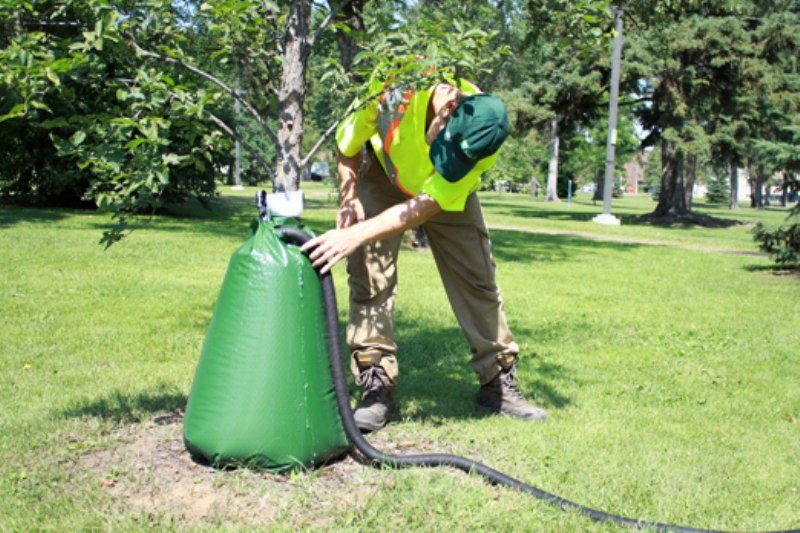THUNDER BAY – A push for the City of Thunder Bay to grow more trees in-house, instead of buying them from suppliers in southern Ontario, fell short by one vote at city council this week.
A proposed tree nursery would save the city money and help it reach a climate commitment to plant more trees, city administration advised council on Monday.
A report from parks manager Cory Halvorsen proposed to raise purchased seedlings in the nursery, suggesting the Water Pollution Control Plant on Atlantic Avenue as a potential location.
A slim majority of councillors were unconvinced the project's long-term benefits justified significant start-up costs, including the addition of a new staff position.
The idea to grow trees in-house was proposed over the summer by Coun. Peng You, who saw the potential for savings given the city's increasing tree-planting needs.
That includes commitments to plant 100,000 trees by 2050 under the net-zero climate plan and to replace around 4,600 trees through the emerald ash borer program, as well as regular planting and replacement operations.
The program would require an investment of time and resources, but ultimately pay off, according to Halvorsen's analysis.
A city nursery could meet 50 per cent of municipal tree-planting needs by 2027, he found, chopping the average cost per tree from $350 to $200, saving an estimated $150,000 a year.
It would also produce higher quality trees better hardened to the local climate, and reduce the risk of invasive species entering the region, he said.
The city’s Forestry and Horticulture department would need to add a permanent staff position to plan and manage the nursery.
The new staffer would also help meet growing demands related to the city’s urban forest management plan, strategies to combat the emerald ash borer and other invasive species, and renewal of the botanical conservatory, Halvorsen told councillors.
“Currently forestry and horticulture is stretched to its capacity with all of the programs we’re working through,” he said. “I'd already been looking for opportunities to create additional planning capacity just to be able to be able to deal with the existing services we provide.”
Coun. Andrew Foulds said the expansion was badly needed.
“I get a lot of complaints about trees,” he said. “That area of our corporation is understaffed and overworked, and it’s something that really matters to citizens.”
The hire would have added $105,000 a year to the department’s budget, along with $30,000 a year in start-up capital costs for the nursery through 2026.
Mayor Bill Mauro said the department’s work was valuable, but found the costs prohibitive.
“The way this math stacks up, I just can’t see how I can support this,” he said. “We come out to about $675,000 of spending before we have trees that could be used to offset [that cost].”
Questioned by Mauro, Halvorsen estimated the nursery investments would take 19 years to pay for themselves, after which the city would begin realizing savings.
“We end up with [a return on investment period] of close to 20 years,” said Coun. Mark Bentz. “This should have been identified in the report. There is no revenue here.”
Coun. Andrew Foulds argued it made sense to think in terms of decades, not years, on the matter.
“I understand we aren’t going to get a direct rate of return for [several] years, but we’re talking about trees,” he said. “Maybe the rate of return has to be pushed out a little bit more than 19 years, because we’re talking about something that takes time to grow.”
“We’re talking about being a climate-ready city, net-zero… This will up our game and position us much better for the future. I think this is a wise investment.”
Coun. Aldo Ruberto agreed, calling the nursery an example of the innovative thinking needed to drive efficiency in local government.
“What it tells me is that city departments can actually do something outside the box,” he said. “I’m very happy to see this.”
Ruberto also emphasized his expectation that costs would be mitigated by grants from government and non-profit sources. The city has previously received funding for tree-planting and expects to find more opportunities, but hadn’t yet identified specific funding for the nursery, staff said.
“There’s a lot more at stake here than just the financial side,” said Coun. Kristen Oliver. “More importantly, we need to focus on the benefits to biodiversity, the environment as a whole, and that we’re helping to offset greenhouse gas emissions,” she said.
Those arguments failed to convince councillors focused on constraining spending.
“This is an addition to the ’22 budget, which we’ve asked administration to bring in at [a 2.25 per cent tax levy increase], which I think is too high anyway,” said Coun. Rebecca Johnson. “Although it would be very nice… I’m not prepared to add another staff member to the budget.”
Coun. Cody Fraser said the proposal was out of line with council’s intention to “reduce the tentacles of the city.”
"We spent the better part of three years attempting to reduce the size of administration," he said. "We went through the Program and Service Review because there was a huge outcry, or an allegedly huge outcry from the community about a bloated administration, too many city workers, having our hand in too many things.”
Council ultimately defeated the proposal on a 6-5 vote Monday. Councillors Foulds, Hamilton, Oliver, Ruberto, and You voted in favour, while councillors Aiello, Bentz, Fraser, Johnson, McKinnon, and Mayor Mauro voted against.
